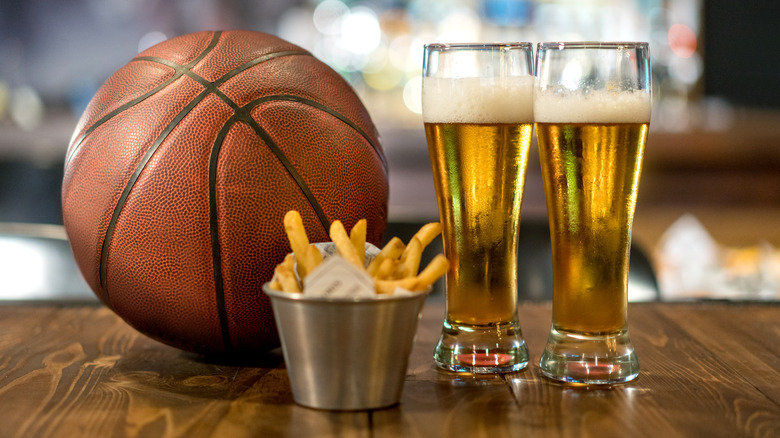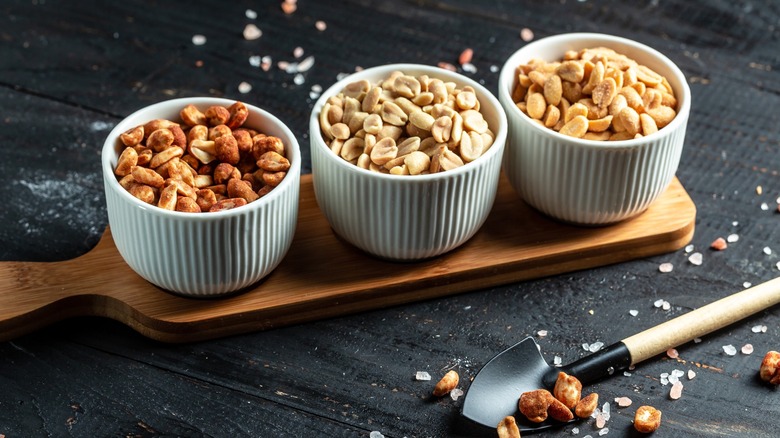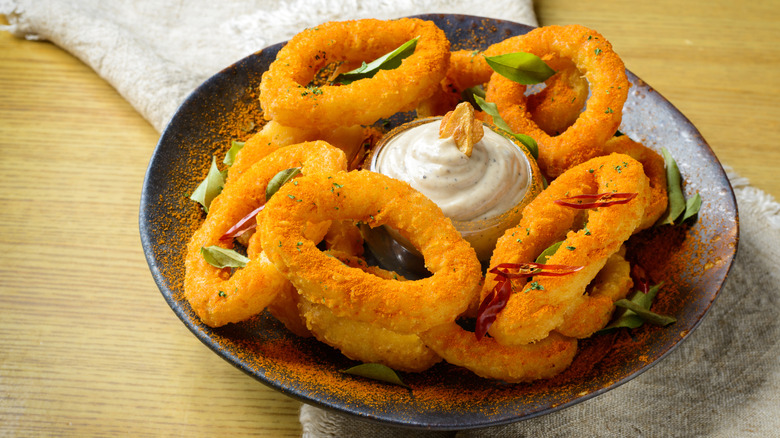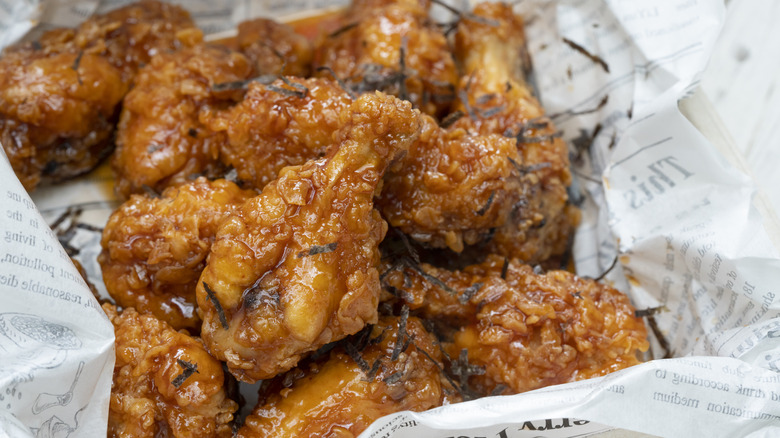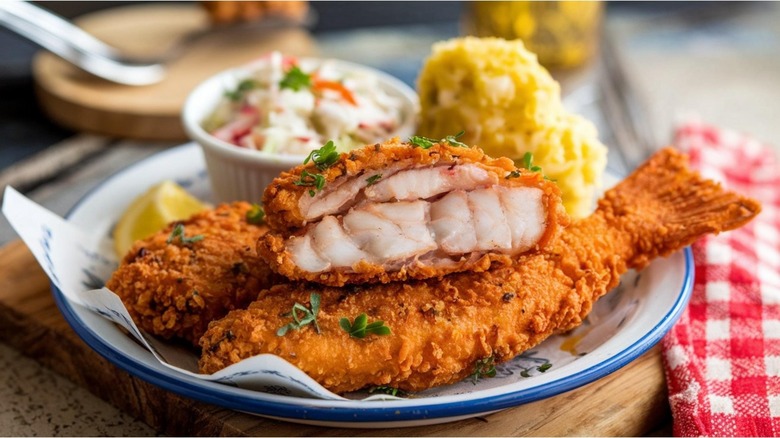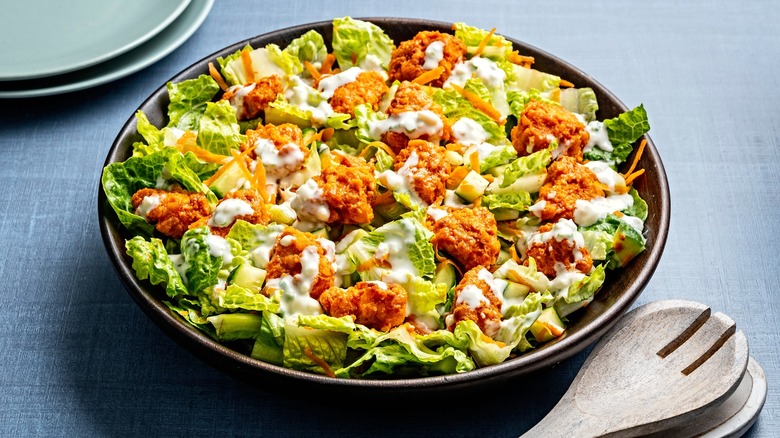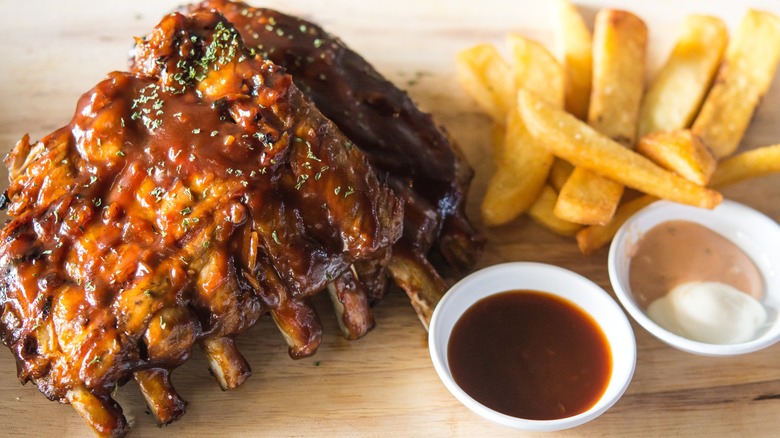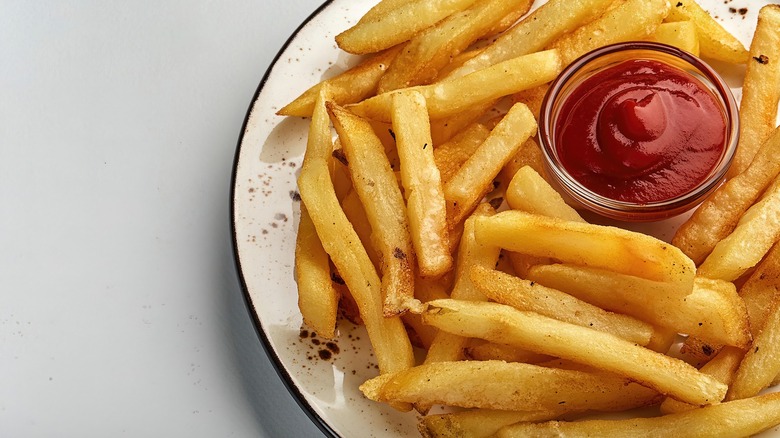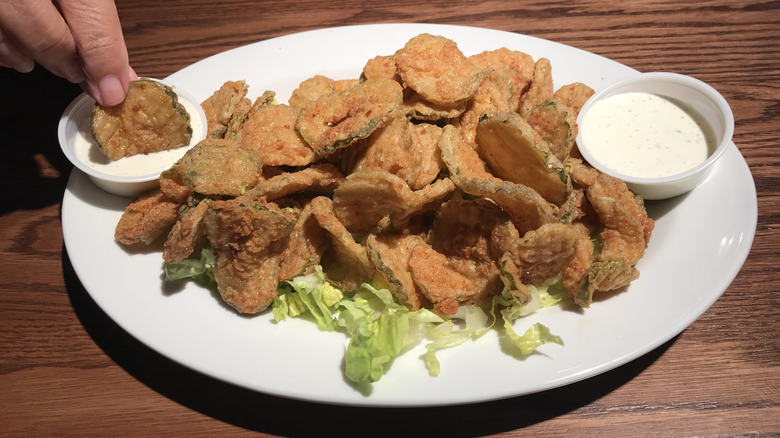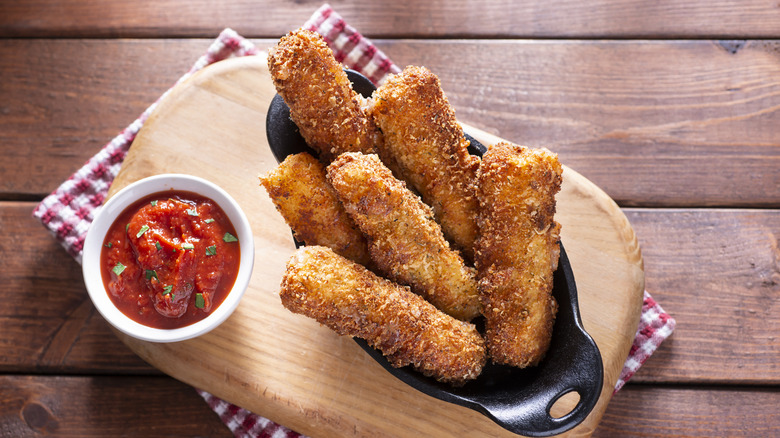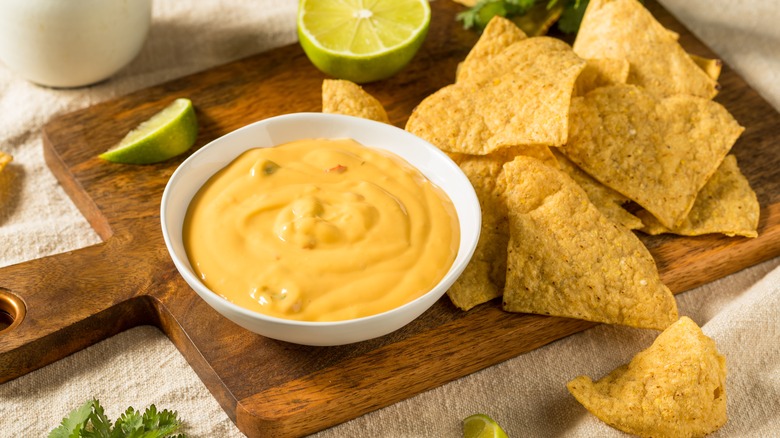Think Twice Before Ordering These Foods At A Sports Bar
You may not think it, but sports bars usually have pretty extensive food menus. And the modern sports bar's birth is intrinsically linked to food service. A pivotal moment in this history came when the sports-focused, Buffalo-area establishment Anchor Bar opted to serve buffalo chicken wings with its beer, inadvertently creating a classic that now shows up on every sports bar menu. However, while sports bars have expanded beyond the humble chicken wing to incorporate a wide range of dishes on their menus, this isn't necessarily a good thing. The abundant food selections you find at sports bars nowadays also include loads of options that you really should be avoiding.
As you might expect, there are a lot of items on these menus that you should steer clear of for nutritional reasons. Sports bars aren't exactly known for their healthy options, after all, and plenty of their foods are soaked in saturated fat, salt, and sugar. However, there are also a bunch of foods at these bars that should be off-limits because of hygiene, quality, or freshness issues. Grab a beer, pull up a bar stool, and get ready to learn the sports bar foods that you should be avoiding.
Bar snacks
A drink and a bowl of bar snacks is a match made in heaven. The history of bar snacks dates back way further than you might think, with small bites like boiled peas and pickled whelks (snails) being served in British pubs during the 19th century. These days, though, bar snacks are typically drier, crunchier affairs, with bowls of peanuts and pretzels commonplace in sports bars.
The issue with these dry, salty snacks, though, is that you never quite know how long they've been sitting in their jars — or who's been handling them. Nuts, chips, and pretzels can sit out on the bar for weeks, going stale the whole time. Unfortunately, sports bars kinda rely on your beer intake being high enough so that you don't notice their lack of crunch.
As well as this, there's no telling how many people have got their hands on these snacks. Nuts and pretzels aren't like entrées, which need to be prepared fresh every time, and as a result, there's more risk of cross-contamination. While this may not be the case in classier sports bars that separate their portions ahead of time, in joints that have slightly less quality control, it's a definite concern. And this is all before you consider how sodium-packed some of these snacks can be, too. No wonder sports bars love serving them: they'll have you buying another refreshing beer in no time.
Onion rings
Onion rings are pretty deceptive, folks. It's no secret to anybody that this appetizer is a deep-fried, fairly unhealthy affair, but something about their thinness and crispiness makes them seem as though they're somehow not quite as bad as other choices soaked in cheese or drizzled with sauce. Well, make no mistake: Onion rings have a high amount of sodium and fat. Just one order from the sports-themed restaurant chain Wings and Rings (where they're served as a side) provides 423 calories, but with that comes 16 grams of fat and 4 grams of saturated fat. Plus, the sodium levels of this dish are through the roof, with 2,075 milligrams per serving — almost the entirety of the 2,300-milligram daily limit suggested by the Dietary Guidelines for Americans published by the United States Department of Agriculture.
Onion rings can also be swimming in dietary cholesterol, with the Wings and Rings order providing 368 milligrams. This is well over the recommended limit of 300 milligrams per day for folks without any risk factors for cardiovascular disease. While we definitely understand that you're likely not heading to your sports bar to get a super-nutritious meal, onion rings are a particularly poor choice.
Fried chicken wings
Sports bars are almost synonymous with chicken wings, and joints that don't serve them can really raise an eyebrow. However, you should also keep an eye on the kind they serve. While baked chicken wings can be a fairly reasonable choice in terms of nutrition (provided that they're not doused with sugary, salty sauce), fried chicken wings can be super unhealthy. At the sports bar chain Duffy's, for example, the nutrition of its Breaded Chicken Wings is kinda shocking.
Each portion of 10 breaded wings at Duffy's provides 1,190 calories, a significant proportion of the amount of calories U.S. adults should be eating per day. As well as this, they also deliver a massive 100 grams of fat and 16 grams of saturated fat. These 16 grams cover 80% of your daily recommended value for saturated fat. The 100 grams of fat is also well out of the suggested range for those following a 2,000-calorie-a-day diet, which is around 44 to 78 grams per day. If you're looking for something a little less impactful on a nutritional level, Duffy's boneless wings are a better choice. Although they still have 63 grams of fat and 4 grams of saturated fat, they're far healthier.
Seafood options
Opting for seafood at a sports bar can seem like a smart choice. While some seafood orders can be as salty and fatty as their meaty counterparts, others can offer a light option in a world of deep-fried foods. The problem with seafood in sports bars, though, is that it's not the most reliable. These bars tend to churn out way more chicken wings than they do salmon filets, and that means that their seafood can be somewhat of an afterthought, and potentially not the freshest choice you can make. While this may not be the case if you live in a coastal town where fresh fish is abundant, if you're significantly in-land, it's probably best to stick to meat.
Additionally, if your sports bar has a "manager's special" fish choice, don't be tempted by it. Running fish specials can be a way for restaurants and bars to clear out their fish stocks, and get rid of filets that are just about to go bad. This doesn't mean that the fish is unsafe or spoiled, of course — it just means that the "special" item won't taste so special after all. This isn't exclusive to fish, either. Anything that's sold as a special in sports bars may be being pushed by the restaurant to work through old or poorly-selling ingredients or stock, so don't be fooled by what seems like an exclusive offer.
Breaded chicken salads
Let's face it: Sports bar menus aren't a picture of health. Between the chicken wings, taco platters, and piles of fries, it's tricky to find something that isn't heavy and tinted with various shades of beige. That's why salads on sports bar menus can feel like salvation — until you look at what's in them. A lot of sports bars have salads based around breaded proteins like chicken, which are almost as salty and fatty as the more obviously processed items.
Take the Buffalo Chicken Salad sold at sports restaurant chain Beef 'O' Brady's, for example. This salad is far from a light, refreshing meal: Essentially, it's a pile of lettuce leaves with a load of crispy boneless wings and croutons dumped onto them. This is reflected in its nutritional values. Each order of the Buffalo Chicken Salad has 7 grams of saturated fat, and a massive 2,640 milligrams of sodium – well over the daily suggested limit. The wildest thing about it is that these nutritional stats are for a salad without any dressing. Add the bar's Caesar Salad dressing to it, and you'll add another 7 grams of saturated fat and 840 milligrams of sodium. So much for a light meal, right? If you're opting for a salad in a sports bar to try and make a healthier choice, it's best to choose one with lean, unprocessed proteins, and a dressing that doesn't have loads of hidden sugars or unhealthy fats.
Ribs
Look, none of us are denying that ribs are absolutely delicious. However, if you're keeping an eye on your macronutrient intake, you're likely going to want to avoid them in sports bars. Rib cuts are incredibly fatty, which is what gives them their flavor — and they're made even more delicious by the addition of salt and sugar via their rubs and glazes. This turns them into a food item that's breathtakingly high in these nutrients, with the sides they come with raising them even further. Order a full rack of the BBQ Baby Back Ribs at Duffy's, and you'll be getting 49 grams of saturated fat, 3,740 milligrams of sodium, 20 grams of sugar, and 580 milligrams of cholesterol, in a meal that has almost 2,000 calories.
The very same platter will provide you with over 160 grams of protein. Although that may sound appealing to all the bodybuilders out there, you really should consider whether you actually need that much. Men and women need around 56 and 46 grams of protein respectively each day, while folks who are physically active or who are trying to build muscle will likely need more. Consuming hundreds of grams daily from meals like ribs, however, can put a strain on your system, and may have a negative impact on your cardiovascular or kidney health.
Fries
We're sorry to be a buzzkill: We know that an order of fries is a time-honored tradition when attending a sports bar. However, we're here to gently inform you that oftentimes, those fries just aren't that good, especially if you're ordering them at peak times. Fries are such a common order at sports bars that the chefs are pretty much constantly churning them out. In some places, they do so in advance, knowing that the fries will soon fly out of the kitchen — but the moment they come out of the fryer, they start to cool down and get moist. One of the reasons that restaurant fries taste so good is that they're served immediately, but if they're not, they can turn from hot and crispy to lukewarm and limp. Unless your sports bar is cooking them to order, they're gonna be pretty disappointing.
It's also worth keeping in mind that fries really aren't that good for you. Yes, yes, we know that's not a surprise, but it's still important to note that some sports bar fries have a wild level of sodium per portion. A single basket of Natural Cut Fries at Wings and Rings will deliver 2,720 milligrams of sodium, more than the entire amount you should be consuming in a whole day. Opt for the cajun seasoning, and you'll be consuming 3,440 milligrams.
Fried pickles
You haven't lived until you've tried fried pickles. A classic sports bar dish which we can thank Arkansas for, each bite is an explosion of salty, vinegary flavor and a combination of crunch from the deep-fried batter and gentle squish from the cooked pickle. We'd recommend you only try this starter once, though. Fried pickles are one of the saltiest things you can order at a sports bar. Each portion at Beef 'O' Brady's provides (wait for it) 4,480 milligrams – almost double the daily recommended limit of 2,300 milligrams. Unfortunately, it also has very little else going for it nutritionally, with a single gram of fiber and 2 grams of protein.
The sodium in this dish comes mainly from the pickles themselves, which are hugely salty, thanks to their brining process. Unfortunately, all this sodium is a big issue. High amounts of sodium contribute to the development of hypertension, which can then impact your risk of heart disease and stroke. High levels of sodium can also negatively affect your kidneys, as well as your eye health, with research finding a link between sodium intake and cataract formation. Are those fried pickles really worth it?
Mozzarella sticks
We have yet to meet a single person who doesn't like ordering mozzarella sticks in a sports bar. However, we think a lot of people would like them less if they knew what they were eating. Mozzarella sticks are typically eaten as a starter, and the level of saturated fat and sodium they provide at the start of your meal just isn't worth it. One order of Amazing Mozzarella Sticks from Duffy's, for instance, has 14 grams of saturated fat (70% of your daily value) and 1,460 milligrams of sodium.
Now, it's likely not a huge shock that mozzarella sticks are that fatty, but it's still worth bearing in mind. Saturated fats have long been known to raise the bad cholesterol levels in our bloodstream, which then puts our heart health at risk. With mozzarella sticks, the saturated fat doesn't just come from the cheese itself, but the deep-frying they undergo, providing a one-two punch of fats that can be pretty impactful. There are plenty of other apps that have less saturated fat, and that help you spread your intake throughout the day: Just ask your server if they can give you a nutritional info card or point you to where you can access it.
Dips
Pretty much every food in life is better with dip. Unfortunately, if you're eating at a sports bar, you'll have to accept that, while they make your food tastier, they'll also make your meal way more unhealthy. In some cases, seemingly simple combos of dips and chips or baked goods can contain disturbing amounts of salt. At Beef 'O' Brady's, the pretzel basket with dip has 6,260 milligrams of sodium – nudging up to triple the maximum amount of sodium you should be eating in a day.
Elsewhere, dips can be chock-full of saturated fat, while also containing staggering levels of sodium. Ordering queso with chips might seem like a good start to your meal at Beef 'O' Brady's, but it will also add 16 grams of saturated fat and 2,750 milligrams of sodium to your daily intake. You'll also get absolutely no fiber in your order, and we can bet that it doesn't contain a whole lot of vitamins and minerals either. Simply put, dips and their accompaniments rarely have much going for them nutritionally in sports bars, and you'd be wise to opt for a different starter.
